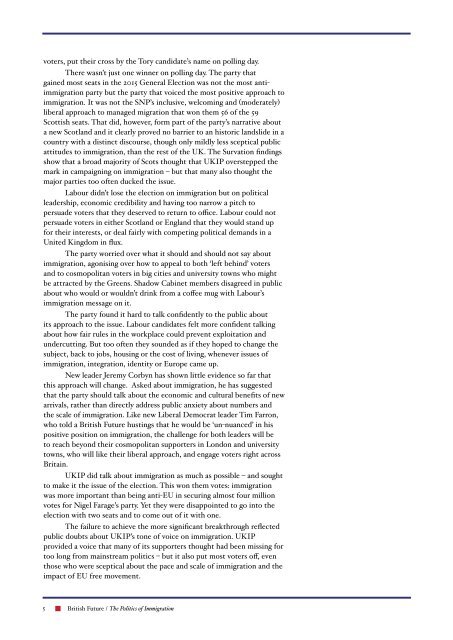THE POLITICS OF IMMIGRATION
The-politics-of-immigration
The-politics-of-immigration
Create successful ePaper yourself
Turn your PDF publications into a flip-book with our unique Google optimized e-Paper software.
voters, put their cross by the Tory candidate’s name on polling day.<br />
There wasn’t just one winner on polling day. The party that<br />
gained most seats in the 2015 General Election was not the most antiimmigration<br />
party but the party that voiced the most positive approach to<br />
immigration. It was not the SNP’s inclusive, welcoming and (moderately)<br />
liberal approach to managed migration that won them 56 of the 59<br />
Scottish seats. That did, however, form part of the party’s narrative about<br />
a new Scotland and it clearly proved no barrier to an historic landslide in a<br />
country with a distinct discourse, though only mildly less sceptical public<br />
attitudes to immigration, than the rest of the UK. The Survation findings<br />
show that a broad majority of Scots thought that UKIP overstepped the<br />
mark in campaigning on immigration – but that many also thought the<br />
major parties too often ducked the issue.<br />
Labour didn’t lose the election on immigration but on political<br />
leadership, economic credibility and having too narrow a pitch to<br />
persuade voters that they deserved to return to office. Labour could not<br />
persuade voters in either Scotland or England that they would stand up<br />
for their interests, or deal fairly with competing political demands in a<br />
United Kingdom in flux.<br />
The party worried over what it should and should not say about<br />
immigration, agonising over how to appeal to both ‘left behind’ voters<br />
and to cosmopolitan voters in big cities and university towns who might<br />
be attracted by the Greens. Shadow Cabinet members disagreed in public<br />
about who would or wouldn’t drink from a coffee mug with Labour’s<br />
immigration message on it.<br />
The party found it hard to talk confidently to the public about<br />
its approach to the issue. Labour candidates felt more confident talking<br />
about how fair rules in the workplace could prevent exploitation and<br />
undercutting. But too often they sounded as if they hoped to change the<br />
subject, back to jobs, housing or the cost of living, whenever issues of<br />
immigration, integration, identity or Europe came up.<br />
New leader Jeremy Corbyn has shown little evidence so far that<br />
this approach will change. Asked about immigration, he has suggested<br />
that the party should talk about the economic and cultural benefits of new<br />
arrivals, rather than directly address public anxiety about numbers and<br />
the scale of immigration. Like new Liberal Democrat leader Tim Farron,<br />
who told a British Future hustings that he would be ‘un-nuanced’ in his<br />
positive position on immigration, the challenge for both leaders will be<br />
to reach beyond their cosmopolitan supporters in London and university<br />
towns, who will like their liberal approach, and engage voters right across<br />
Britain.<br />
UKIP did talk about immigration as much as possible – and sought<br />
to make it the issue of the election. This won them votes: immigration<br />
was more important than being anti-EU in securing almost four million<br />
votes for Nigel Farage’s party. Yet they were disappointed to go into the<br />
election with two seats and to come out of it with one.<br />
The failure to achieve the more significant breakthrough reflected<br />
public doubts about UKIP’s tone of voice on immigration. UKIP<br />
provided a voice that many of its supporters thought had been missing for<br />
too long from mainstream politics – but it also put most voters off, even<br />
those who were sceptical about the pace and scale of immigration and the<br />
impact of EU free movement.<br />
5 British Future / The Politics of Immigration


